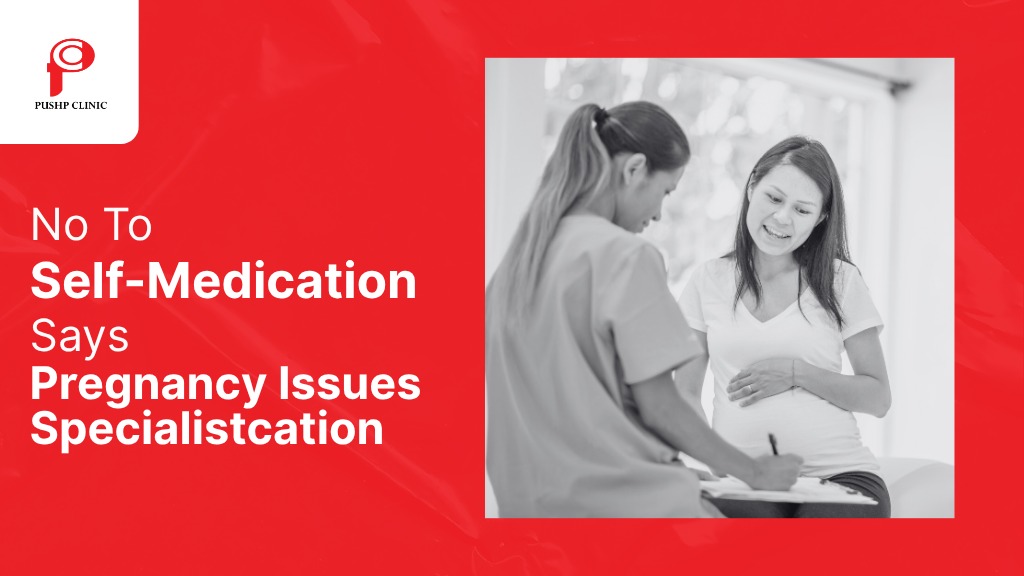Pregnancy is a big journey — your body shifts, your emotions run deep, and your mind starts thinking in new ways. For many women, it brings joy, hope, and a whole new sense of responsibility. But along with that comes the discomfort, the “should I take this medicine?” moments, and the well-meaning advice from everyone around. It’s easy to reach for a painkiller, a home remedy, or something you read about online when you’re feeling unwell. But according to a pregnancy issues specialist at Pushp Clinic, self-medication during pregnancy can be more harmful than we realize.
This blog is for every woman walking through the beautiful (and sometimes challenging) journey of pregnancy — and for the people who love and support her. Let’s talk about why the best gynecologist in Indore and every experienced women’s health doctor in Indore strongly advises against self-medication and what safer alternatives exist.
Why Self-Medication During Pregnancy Is Risky
Our bodies change dramatically during pregnancy. Hormones fluctuate, the immune system shifts, and even the way medications are absorbed changes. What may seem like a “harmless” tablet or syrup can have unexpected effects, not just on the mother, but also on the developing baby.
Some of the most common risks of self-medication include:
- Wrong dosage: Even common medications can be risky if the dosage isn’t right for a pregnant body.
- Hidden ingredients: Many over-the-counter products contain substances not recommended during pregnancy.
- Delayed diagnosis: Covering symptoms with medication can delay discovering underlying issues that need medical attention.
- Drug interactions: Pregnant women may already be on supplements or prescribed medicines; adding something new without guidance can cause reactions.
For these reasons, a pregnancy issues specialist urges that no medicine, not even herbal ones, should be taken without medical advice.
Common Self-Medication Scenarios (and Why They’re Problematic)
Let’s be honest — many of us have Googled symptoms and followed random advice. During pregnancy, that habit can be particularly dangerous.
❌ “My cousin took this pill and she was fine.”
Every woman’s pregnancy is different. What worked for someone else might not be safe for you. A women’s health doctor in Indore once shared how a patient took a painkiller suggested by a relative — it triggered contractions early. Luckily, they got help in time.
❌ “It’s just a herbal remedy.”
Natural doesn’t always mean safe. For example, certain herbal teas and oils can affect the uterus and hormones.
❌ “It’s just paracetamol!”
While some medications like paracetamol may be safe in specific doses, taking it frequently or in combination with other drugs without supervision isn’t recommended.
The Role Of A Pregnancy Issues Specialist
When you’re pregnant, every little discomfort can feel bigger. But instead of guessing, you deserve the support of someone who knows exactly what’s going on inside your body. That’s where a pregnancy issues specialist steps in.
They don’t just treat symptoms — they look at the whole picture. Is your nausea normal or too extreme? Is that backache typical or a sign of something else? Every consultation with the best gynecologist in Indore is a step toward safer, well-monitored care for you and your baby.
When Should You See A Gynecologist?
Some women wait until their discomfort becomes unbearable before seeing a doctor. But here’s the truth — early visits can prevent complications. You should see a women’s health doctor in Indore if you experience
Unusual pain or cramping
Frequent headaches
Persistent nausea or vomiting
Spotting or heavy bleeding
Sudden swelling in hands, feet, or face
Any doubts or questions about medicines
Don’t wait for things to “settle down.” Trust your instinct — if something feels off, it’s okay to ask for help.
Managing Common Pregnancy Discomforts Safely
Not every ache needs a pill. Here are doctor-approved ways to handle some of the most common pregnancy issues — safely and naturally:
🤰 For nausea: Small, frequent meals, ginger tea (if approved by your doctor), and avoiding strong smells can help.
🤰 For backache: Use a pregnancy pillow, avoid standing too long, and ask your doctor about gentle prenatal stretches.
🤰 For constipation: Stay hydrated, eat fiber-rich foods, and talk to your gynecologist before taking any laxative.
🤰 For heartburn: Avoid spicy or fried foods, eat smaller meals, and don’t lie down immediately after eating.
🤰 For headaches: Rest in a dark room, use a cold compress, and check with your pregnancy issues specialist before taking any medicine.
Most importantly, don’t suffer in silence. The best gynecologist in Indore is there not just for major health issues but also for day-to-day guidance.
Real Advice Beats Internet Advice
It’s easy to get lost in blogs, forums, and YouTube videos. But every pregnancy is unique. What works for someone online might be harmful for you. That’s why one-on-one conversations with a women’s health doctor in Indore can’t be replaced.
At Pushp Clinic, pregnant women are not just “cases” — they’re individuals with different concerns, bodies, and stories. The advice shared in this blog comes from real conversations with a pregnancy issues specialist who listens first, treats second, and always prioritizes safety and comfort.
Conclusion
Pregnancy is filled with questions, discomforts, and decisions — and sometimes it feels like the answers are everywhere and nowhere all at once. But one thing is clear: when it comes to your health and your baby’s well-being, guessing should never be the answer.
Self-medication might seem like a quick fix, but it often carries quiet risks. Choosing to consult a trusted women’s health doctor in Indore can bring peace of mind, safer treatment, and healthier outcomes.
At Pushp Clinic, the care shared here is what expecting mothers receive every day — kind, clear, and backed by experience. If you or someone you love is pregnant and unsure about what’s safe or not, don’t hesitate. Reaching out to the best gynecologist in Indore could be one of the most important steps in the journey to safe motherhood.
